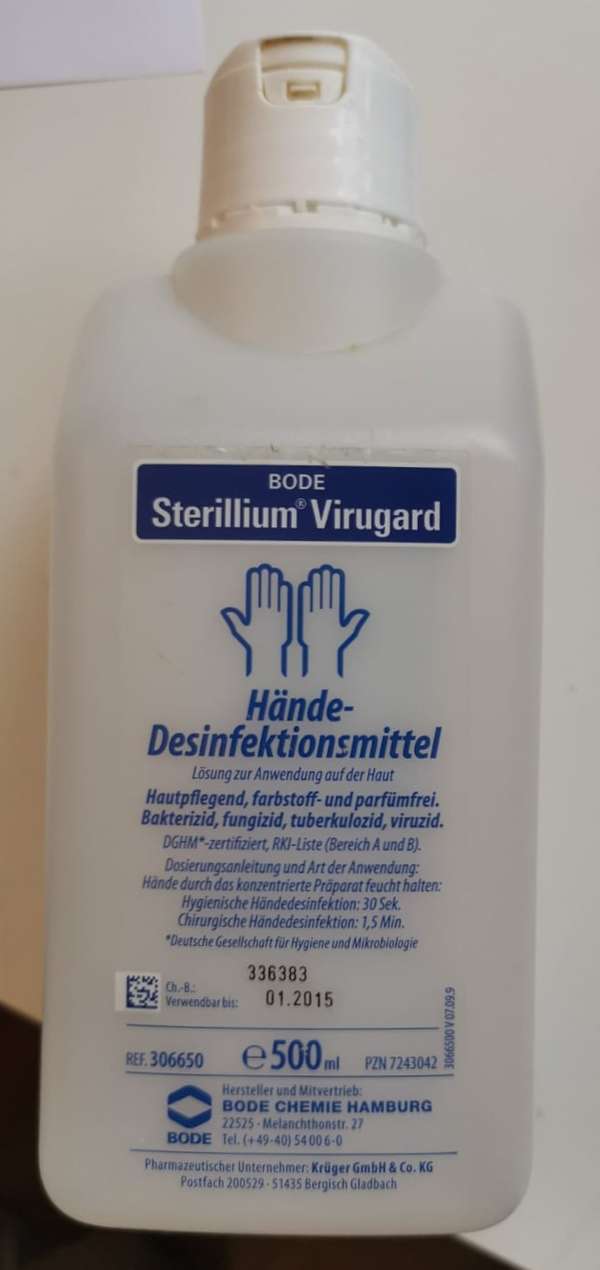Stay clean (and most of all: healthy)!
- 25. May 2020 - Anniversary, General, Germany, Hamburg, Historical Events, Knowledge, Personalities
A birthday is usually a great opportunity to invite many guests, especially, if the inviting party has reached an admirable age. These days, due to the Corona crisis, these kinds of events are cancelled in large numbers. If people nevertheless get together, many are relieved if some disinfectant is available. It therefore makes for a nice change, if we talk about the birthday of something that would never invite anyone, but that is still worth celebrating - and especially in times of Corona.
Now, who or what is turning 55 years this June? Everyone here at our office is younger. We owe our age not least to the jubilee: the Sterillium disinfectant! It was the first marketable hand disinfectant worldwide and its name has become a generic term in Germany for any disinfectant just like the brand name Band-Aid is used generically for adhesive bandages or medical plasters.
Sterillium, currently highly coveted and in short supply, is produced in Hamburg by the company BODE Chemie and first left the company’s production facilities in June 1965. Since then, these transparent blue or white liquids and gels with a slightly pungent smell have saved health and lives. The BODE Chemie company is today part of the HARTMANN group from Heidenheim in Southern Germany. But the story of the disinfectant remains Hamburg based for the inventor of the Sterillium was Peter Kalmár, a former chief physician at the University Hospital in Hamburg-Eppendorf.
To make this Hamburg based story of success possible, we have to go back to Hungary. Peter Kalmár, born in Hungary in 1934, was a student of medicine in Budapest. In 1956, he fled to the West and finished his medical studies in the Federal Republic of Germany. In the early 1960’s, he became an assistant physician at the cardiac surgery unit at the Hamburg University Hospital.
Those who had to be operated could have highest confidence in the expertise of the operating physicians. But the procedure of cleansing prior to an operation was elaborate and laborious and the state of purity was impermanent. If the operating physicians and the surgery assistants came too close to each other, the cleansing procedure of thoroughly washing and scrubbing their hands and forearms and rinsing them with quickly evaporating alcohol took minutes for every single person involved. This was certainly not ideal, especially if surgery had already begun. Also, when doing their medical rounds, physicians unknowingly and unwillingly carried germs from one patient to the other. This is why wound infections were one of the major reasons for standard operations to become a real risk.
Peter Kalmár decided to tackle this problem and started experimenting. In a joint effort with researchers of the BODE Chemie company he developed a preparation that could be poured and dispensed in the hands. This liquid that can kill all germs within seconds was called Sterillium. This breakthrough and several other modifications in sanitary practice had the effect that the rate of infections and deaths at the Hamburg University Hospital cardiac surgery unit declined sharply. Sterillium quickly took over all areas where a thorough disinfection is indispensable for peoples’ health and lives.
The Sterillium formula for success is today sold and used all over the world. It is omnipresent in hospitals, medical offices, and other institutions of health and care services. If you have one of these bottles at home, consider yourself fortunate. The high demand for disinfectants outruns the production rates in times of the Corona crisis. However, as long as you do not do surgery yourself or other medical necessities require its use, you can put your mind at rest when facing empty store shelves of disinfectants. For all daily and general purposes, normal soap does a perfect job. Soap is indeed one of the ancient tools of mankind. Her cleansing effect was well known in ancient Rome and even the Romans were by far not the first to use saponaceous substances for hygiene.


0 comments